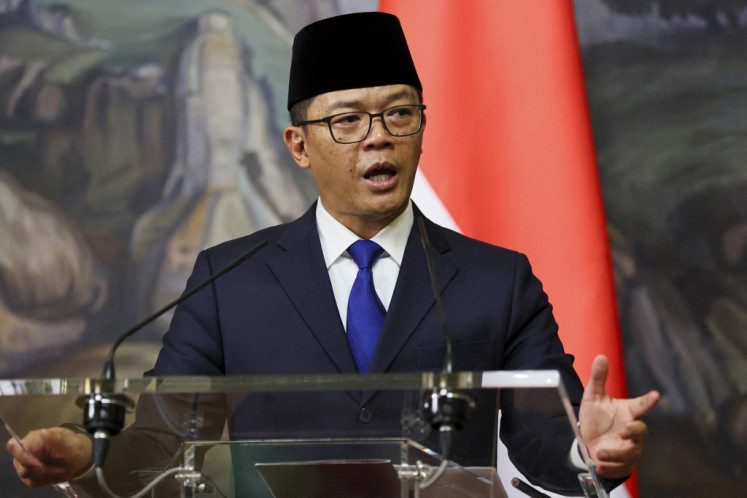Popular Reads
Top Results
Can't find what you're looking for?
View all search resultsPopular Reads
Top Results
Can't find what you're looking for?
View all search resultsIndonesia: The promised land
Indonesia is no stranger to the presence of transnational underworld organizations such as the Chinese Triads, Japanese Yakuza, Russian Organisatziya and Italian La Cosa Nostra
Change text size
Gift Premium Articles
to Anyone

I
ndonesia is no stranger to the presence of transnational underworld organizations such as the Chinese Triads, Japanese Yakuza, Russian Organisatziya and Italian La Cosa Nostra.
There is even growing evidence that this country is becoming a “hotspot” for international criminals and terrorists to develop relationships and help each other out with their needs and operations.
The most attractive business in Indonesia is, of course, the vast quantity of logs, subsidized fuel and coal that can easily be smuggled onto black markets abroad.
The trafficking of illegal drugs, firearms, toxic waste and prostitutes continues unabated as there are huge amounts of money to be made from these illicit businesses. Last but not least, there is a lot of dirty money in this country that needs laundering too.
Security experts have warned that Indonesia must take quick and decisive measures to combat trans-national organized crime groups operating within its territory.
Globalization, experts claim, has given unprecedented freedom to transnational criminals wishing
to expand their operations worldwide, and many groups have begun using Indonesia as a base for their activities.
As expressed time and time again by the director of the United Nations Interregional Crime and Justice Research Institute (UNICRI), Sandro Calvani, globalization benefits terrorists because they can develop relationships with organizations similar to their own and branch out their operations.
One example often referred to is how illegal drug manufacturers and traffickers hire terrorists to protect their interests.
It is easy to imagine where terrorists would go to spend their money. Bombs could be purchased by the Russian Organisatziya, high-tech telecommunication devices could be bought from Yakuza, fake passports could be provided by the Triads and money laundering could be left to the Italian Mafia.
Despite striving for different outcomes, terrorist groups and transnational criminals are able to forge a bloody alliance based on their similar traits. They both rely on ruthless methods such as kidnapping, murder, extortion and armed robbery.
The Indonesian Police (Polri) have dealt spectacularly with terrorists, but we should remember that our domestic situation is often ideal for breeding criminal activity, and terrorist groups are beating our armed forces when it comes to racing for armament.
Just look at the performance of our bureaucracy and law enforcement institutions, as well as the
alleged involvement of the Indonesian Military (TNI) in illegal businesses. These conditions can create fertile breeding grounds for illicit activities.
From a historical and anthropological perspective, the Indonesian culture of crime is very complicated and cannot be dealt with easily.
In fact, organized crime has played a very important role in Indonesian history and is deeply rooted in our culture. One of our most influential pre-colonial states was founded by a gangster.
The state, the Tumapel kingdom, was founded in 1222 by prominent criminal Ken Arok.
During the colonial era, organized crime operated widely in rural areas. A report by tobacco planter C. Armand in 1872 showed cattle theft, extortion, robbery, opium smuggling, violence and widespread intimidation were daily phenomena.
Tragically, thanks to democracy, the pattern of crime continues and has even worsened. Due to rampant money politics, many questionable individuals have managed to win parliamentary elections, be crowned as heads of local governments and occupied strategic positions in major political parties.
Shamelessly, they also often camouflage their operations under various social organizations such as youth and ethnic solidarity, and even religious movements.
Smuggled prostitutes from mainland China, Central Asia and Eastern Europe are now become a major part of the night life in Indonesia. An ever increasing number of people are dying from drug overdoses, and a black market for firearms is blossoming. Deforestation, irresponsible mining, industrialization and environmental destruction have continued at an ever quickening pace across the country.
Terrorists are of course pleased by such anarchic situations. It allows them to easily intertwine with other criminal groups to switch ID cards and driver’s licenses, find hiding places and recruit new members to carry out missions.
It is for this reason that even the most wanted terrorist in the country, Noordin M Top, managed to marry four women despite a massive manhunt being underway for him by security forces nationwide.
Under such circumstances, it is no wonder that the threats to security outlined by the UN are still prevailing in Indonesia: the trafficking of illegal drugs, terrorism, environmental degradation, armed political conflict and transnational organized crime flourish.
However, these threats are inseparable from the fact that around 240 million Indonesians still live in massive poverty, while the divide between rich and poor continues to grow wider.
The writer is a journalist and former head of Tempo Magazine’s International News Desk.









